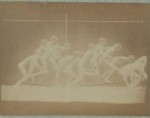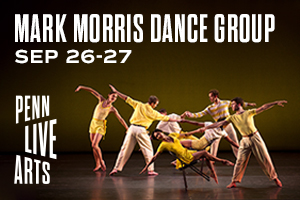
The Core and the Corps of Swan Lake
by Lynn Matluck Brooks
I didn’t expect to, but I loved Pennsylvania Ballet’s Swan Lake. Why?
Just this morning, I was chatting with a former student about the value of a core to a program of learning. We were pondering the capacity to “continue the conversation” with thinkers, works, and ideas that have set the fundamental questions, still engaging us, in motion. For ballet and related dance forms, Swan Lake figures pretty strongly into our core. Choreographed in 1895 by Marius Petipa and Lev Ivanov in St. Petersburg, Russia, the ballet both crystallized the romanticism of the nineteenth century and laid a foundation for the abstraction of the twentieth. Its dramatic and technical riches, along with the potential for stunning visual effects in staging, have made it the kind of multi-layered classic that artists and audiences keep coming back to.
Among those riches: The ballerina has to be fragile (Act 2) and then steely (Act 3), and even both at once (Act 4); the prince has to be boyish and then suddenly grow up to choose death over betrayal; the steps and movements throughout reveal the slightest flaw, and greatest virtuosity, in a dancer’s balance, landings, and turns; and the romantic and royal settings give color, mystery, and flow to a fairy-tale story that also plunges to the core of human desire and aspiration.
Angel Corella, PAB’s artistic director, made the right choice, I think, in going back to the classical program and choreography of this ballet. Many choreographers have tinkered with this ballet—continuing their conversations with the work—and the last time I saw PAB perform it was in Christopher Wheeldon’s 2005 version, a highly psychological analysis of the ballet-as-rehearsal. I remember finding it long. I didn’t this time around. Rather, the dramatic flow worked for me—the colorful, pseudo-royal party scenes (sets and costumes by Benjamin Tyrrell), with their stylized character dances, alternating with the stark choreographic geometry and wildness of nature in the lakeside swan-dominated acts. The one novelty, as far as I could tell, was a short solo for the evil sorcerer, Von Rothbart (played by Ian Hussey), in Act 3, smack in the middle of the famous “Black Swan pas de deux.” I’m not sure we needed it narratively, but I was glad to see Hussey, a Philadelphia favorite, take the stage.
Aside from that, what drew my attention repeatedly was the precision of the staging, and particularly of the corps de ballet. This choreography, from start to finish, pits sizable, synchronized group dancing against the dramatic action of the soloists. If those group sections are weak, the whole work sags, looks ragged, and drags the soloists down. Not a danger for this PAB production: the corps was sharp as the jagged rocks framing the lake before which the swan flock fluttered, bowed, and posed. Truly impressive! Kudos to the corps. There were many lovely dancers to notice, but I want to highlight the floating musicality of So Jung Shin and the sparkle of Zecheng Liang and Ashton Roxander.
I had the pleasure of seeing the elegant, nobly proportioned Sterling Baca as Prince Siegfried, in a performance I thoroughly trusted and enjoyed (although he was perhaps a bit overly smiley at times), and the rock-solid Lillian Di Piazza—her Odile was tempered steel and she worked to meet the fragility of Odette. Peter Weil as Benno had an impetuous attack that sometimes threatened to overwhelm his landings, but that nonetheless made sense for the young prince’s fun-loving friend.
I did ponder the oddity of watching these quaint monarchic rituals in a day and age so far from that pretend-feudal world. In its original Russian performance, Swan Lake’s audience was the Tsar and his court. Yet our very distance from such a world now makes the work even more the fairytale—an archetypal story of coming-of-age, dreaming and failing, loving and losing and yet triumphing in the end. Yes, one of those core stories.
Swan Lake, Pennsylvania Ballet, Mar. 8-18, paballet.org/programs/swan-lake/
By Lynn Matluck Brooks
March 11, 2018









